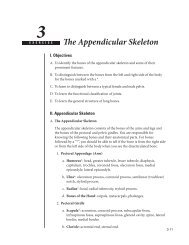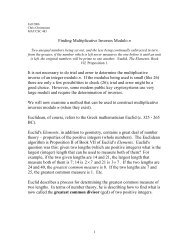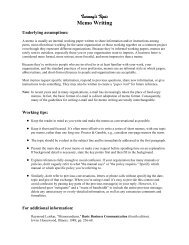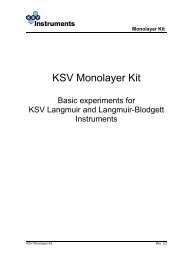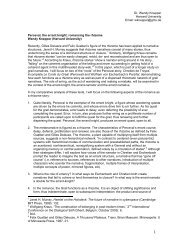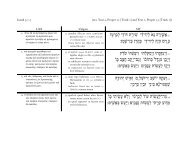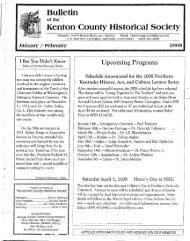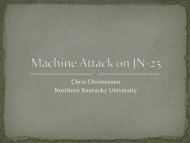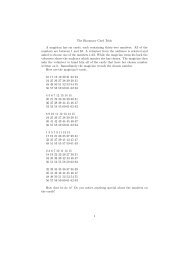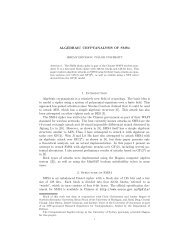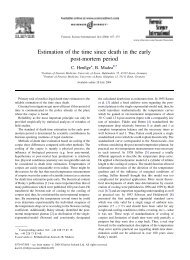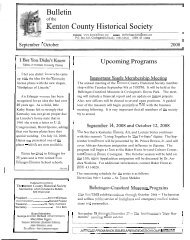An-Nawawi's 40 Hadith
An-Nawawi's 40 Hadith
An-Nawawi's 40 Hadith
You also want an ePaper? Increase the reach of your titles
YUMPU automatically turns print PDFs into web optimized ePapers that Google loves.
Selections from <strong>An</strong>-Nawawī’s Forty Ḥadīth Page 6<br />
O My servants, I have forbidden wrong-doing 33 for Myself and have made it forbidden among<br />
you, so do not wrong one another. O My servants, all of you are astray except for the one I have<br />
guided, so ask guidance of Me and I will guide you. O My servants, all of you are hungry except<br />
for the one I have fed, so ask food of Me and I will feed you. O My servants, all of you are naked<br />
except for the one I have clothed, so ask clothing of Me and I will clothe you. O My servants,<br />
you sin night and day. It is I who forgive all sins, so ask My forgiveness and I will forgive you. O<br />
My servants, you will never attain to My power of harming so as to harm Me, nor my power of<br />
benefiting so as to benefit Me. O My servants, were the first of you and the last of you, those of<br />
you who are humans and those who are jinn, as good as the most pious heart among you, that<br />
would add nothing to My kingdom. O My servants, were the first of you and the last of you,<br />
those of you who are humans and those who are jinn, as wicked as the most wicked heart among<br />
you, that would take away nothing from My kingdom. O My servants, were the first of you and<br />
the last of you, those of you who are humans and those who are jinn, to rise in a single place and<br />
petition Me and I were to give to each what he asked, that would not lessen what I have anymore<br />
than a needle inserted into the ocean [would raise its level]. O My servants, it is your works alone<br />
for which I shall hold you to account and then recompense you for, so let him who finds good [in<br />
the Hereafter] praise Allah, and he who finds otherwise blame no one but himself.<br />
Muslim relates this.<br />
25 On the authority of Abū Dharr (may Allah be pleased with him):<br />
Some of the Companions 34 of the Messenger of Allah (may the blessings and peace of Allah be<br />
upon him) said to the Prophet (may the blessings and peace of Allah be upon him), “O Messenger,<br />
the rich take all the rewards. They pray just as we do and they fast just as we do, but they can<br />
give in charity out of the superabundance of their wealth [and so surpass us in storing up merit<br />
that will bring rewards].” He said, “Has not Allah appointed for you what you should give in<br />
charitable alms? Truly every tasbīḥa 35 is an alms, every takbīra 36 is a charity, every taḥmīda 37 is a<br />
charity, and every tahlīla 38 is a charity; to command what is right is a charity, to forbid what is<br />
wrong is a charity; and even in sexual intercourse [with one’s wife] there is a charity.” They said,<br />
“O Messenger of Allah, [do you mean that] when one of us fulfills his sexual desire [with his wife]<br />
there will be for him a reward for that?” He said, “What is your opinion? 39 If he put it in a forbidden<br />
place, would he not bear responsibility? Likewise, if he puts it in a permitted place, he will<br />
have a reward.” <strong>40</strong><br />
33<br />
Other translations of ẓulm are: wrong, iniquity, injustice, unfairness; oppression, repression, suppression, tyranny.<br />
34<br />
The Arabic word Ṣaḥābī (pl. Aṣḥāb or Ṣaḥāba) is given to a person who met the Prophet, believed in him, and died<br />
a Muslim. (Ezzeddin and Johnson-Davies)<br />
35<br />
To say Subḥāna ‘llāh (“Exalted be Allah”).<br />
36<br />
To say Allāhu akbar (“Allah is most great”).<br />
37<br />
To say Al–ḥamdu lillāh (“Praise be to Allah”).<br />
38<br />
To say Lā ilāha illā ‘llah (“There is no god but Allah”).<br />
39<br />
lit. “Have you seen?”<br />
<strong>40</strong><br />
Other translations: “What is your opinion? Had He put it among the things forbidden it would have been sinful for<br />
one, so when He put it among the allowable things there was a reward for it also.” and “Do you [not] think that were he to<br />
act upon it unlawfully he would be sinning? Likewise, if he has acted upon it lawfully he will have a reward.” (Ezzedin<br />
and Johnson-Davies)



